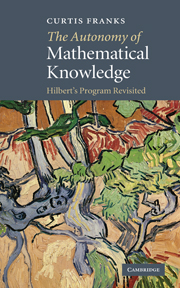5 - Interpreting Gödel's second incompleteness theorem for Q
Published online by Cambridge University Press: 07 January 2010
Summary
HISTORICAL BACKGROUND
In the 1950s Georg Kreisel posed the question whether the provability of Gödel's second incompleteness theorem for Robinson's arithmetic Q, if such a proof were ever discovered, could be seen as a demonstration of “the unprovability in Q of Q's consistency.” According to Kreisel this question arises because Gödel's techniques were not adequately arithmetical: “Gödel's work on formulae expressing the consistency of classical arithmetic goes beyond arithmetic concepts because it uses metamathematical interpretation” ([1958], p. 177). In Gödel's [1931] paper, arithmetical formulas “express” metatheoretical properties like consistency through binumeration. Since a binumeration is a correlation between some formal sentences and some yet-to-be-formalized meta-mathematics, the binumeration cannot be verified by purely arithmetic means. That is, the binumeration cannot be arithmetized. Thus in order to verify that a formula expresses consistency, one must step outside of the arithmetical setting. Gödel had not shown that an arithmetic theory could pose the question of its own consistency on its own terms. Kreisel suggested that this might be possible, but that in very weak settings like Robinson's theory it was unlikely.
In [1960] Solomon Feferman proposed a method to allow arithmetical theories to formulate statements about their own metatheory more directly. He presented a style of arithmetization in which one need not rely on evaluation outside of the setting of arithmetic to determine whether a formula properly expresses a meta-mathematical property. The technique proceeds thus: One wants a sentence of arithmetic to express, for example, that arithmetic is consistent.
Information
- Type
- Chapter
- Information
- The Autonomy of Mathematical KnowledgeHilbert's Program Revisited, pp. 139 - 168Publisher: Cambridge University PressPrint publication year: 2009
